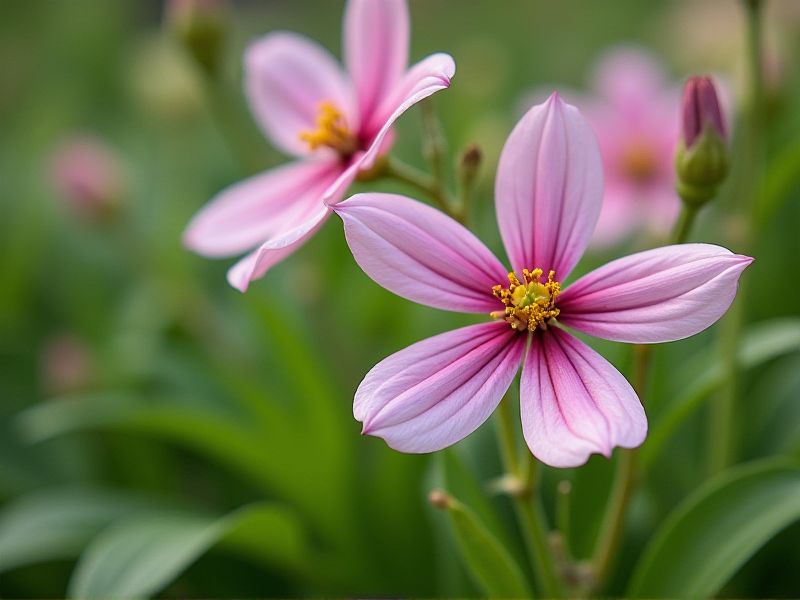
Consider cultivating allergen-free plants such as peace lilies, spider plants, and bamboo palms, which are known for their low allergenic potential. These plants not only purify indoor air but also thrive easily in various light conditions, making them ideal for sensitive gardeners. Utilizing hypoallergenic varieties can significantly reduce respiratory issues while enhancing your gardening experience. Exploring native plants is another way to find species that are less likely to trigger allergic reactions, as they are adapted to local climates and soil conditions. Incorporating these choices into your garden allows you to enjoy the beauty of nature without compromising your health.
List of some Allergen-free plants that suit sensitive gardeners
- Boston Fern (Nephrolepis exaltata)
- Areca Palm (Dypsis lutescens)
- Lady Palm (Rhapis excelsa)
- Bamboo Palm (Chamaedorea seifrizii)
- Spider Plant (Chlorophytum comosum)
- Rubber Plant (Ficus elastica)
- Gerbera Daisy (Gerbera jamesonii)
- Peace Lily (Spathiphyllum wallisii)
- Parlor Palm (Chamaedorea elegans)
- Dracaena (Dracaena spp.)
Important things about Allergen-free plants that suit sensitive gardeners
Specific Allergen-Free Plant Varieties
Sensitive gardeners can benefit from cultivating specific allergen-free plant varieties, which minimize the risk of allergic reactions. For example, hypoallergenic flowers like the 'Azalea' or 'Hydrangea' produce less pollen, making them ideal choices for those with sensitivities. Edible plants such as the 'Tomato' and 'Carrot' are not only allergen-friendly but also add nutritional value to your garden. Incorporating these selections ensures a flourishing garden environment while prioritizing your health and comfort.
Hypoallergenic Flowering Options
If you have allergies or sensitivities, hypoallergenic flowering plants like the Astilbe and the Hellebore are excellent choices for your garden. These plants produce minimal pollen, making them perfect for creating an allergen-free environment. Low-maintenance options such as the Fern and the Caladium also thrive in various conditions while ensuring a beautiful display without triggering sensitivities. Incorporating these plants into your landscape can enhance your outdoor space while prioritizing your health and comfort.
Low Pollen-Producing Plants
Low pollen-producing plants are ideal for sensitive gardeners looking to create an allergen-free landscape. Examples include the sleek and hardy ornamental grasses, such as Miscanthus or Pennisetum, which provide texture without the sneeze-inducing pollen. For colorful blooms, consider adding cultivars of hydrangeas or geraniums, known for their minimal pollen output. Your garden can thrive with beauty and comfort by choosing these low-allergen plants, ensuring a more enjoyable outdoor experience for those with sensitivities.
Foliage Vs. Flowering Plants
Foliage plants, such as the snake plant and pothos, are excellent allergen-free options for sensitive gardeners due to their low pollen production and ease of care. Alternatively, flowering plants like the bromeliad and peace lily offer aesthetic appeal while minimizing allergy risks, as they primarily produce minimal airborne irritants. When selecting plants, consider maintaining a balance between greenery and blooms that thrive indoors with low maintenance requirements. Incorporating these types of plants into your home can enhance your indoor air quality, making it a healthier environment for everyone.
Native Plants For Local Biodiversity
Allergen-free native plants are essential for enhancing local biodiversity while accommodating sensitive gardeners. Species such as the blue-eyed grass (Sisyrinchium angustifolium) and coreopsis (Coreopsis spp.) not only provide vibrant colors but also attract beneficial pollinators like bees and butterflies. Incorporating these plants into your garden supports the local ecosystem, reduces the risk of allergic reactions, and promotes a healthier outdoor environment. Native ferns, such as Christmas fern (Polystichum acrostichoides), further enhance your landscape's resilience, offering both aesthetic appeal and low maintenance requirements.
Indoor Plants With Low Allergen Impact
Indoor plants such as spider plants, peace lilies, and snake plants are excellent choices for sensitive gardeners seeking low allergen impact. These species release oxygen while filtering indoor air pollutants, making them both safe and beneficial for allergy sufferers. They require minimal maintenance, thriving in various lighting conditions, which is ideal for indoor environments. Choosing allergen-free plants can enhance your living space while promoting a healthier atmosphere.
Moisture Retention And Dust Reduction
Allergen-free plants, such as spider plants and peace lilies, are perfect for sensitive gardeners seeking to improve air quality and enhance moisture retention in their homes. These plants not only filter airborne toxins but also contribute to increased humidity levels, creating a more comfortable indoor environment. By reducing dust accumulation, these low-maintenance options minimize allergens, making your living space healthier and more inviting. Incorporating such plants can transform your gardening experience while ensuring a safe haven from common irritants.
Soil Types That Minimize Allergens
Choosing allergen-free plants requires understanding soil types that minimize allergens. Sandy soils, known for their excellent drainage, help reduce mold growth, a common allergen factor. Clay soils, although retaining moisture, can harbor allergens if not properly managed, while loamy soils strike a balance between water retention and drainage, making them ideal for growing hypoallergenic plants. Selecting plants such as ferns, snake plants, and azaleas ensures a beautiful garden while keeping allergen levels low, providing a comfortable experience for sensitive gardeners.
Maintenance Practices To Reduce Allergens
Selecting allergen-free plants enhances your gardening experience, especially for sensitive gardeners. Consider varieties like hypoallergenic ferns, which produce minimal pollen and thrive in various lighting conditions. Additionally, the use of perennial flowers such as daylilies and peonies can beautify your garden while reducing allergen exposure. Regular maintenance, including timely pruning and mulching, also contributes to minimizing allergenic particles in the air.
Resources For Allergen-Free Gardening Guidance
Allergen-free gardening offers a variety of plant options that cater to sensitive gardeners looking to create a safe outdoor space. Try incorporating hypoallergenic plants such as astilbe, hostas, and ferns, which produce minimal pollen and are gentler on allergies. You can also focus on non-flowering plants like evergreens or certain types of shrubs, which provide greenery without attracting allergy-triggering insects. For the best results, consider consulting local gardening resources or allergen-free gardening guides tailored to your climate and environment.
